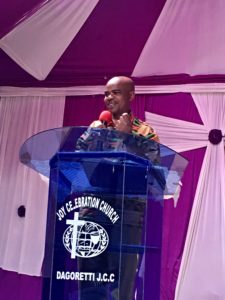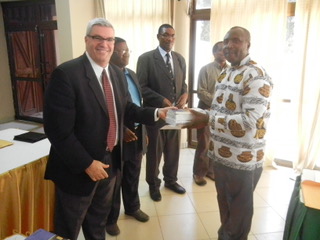“…the biggest problem with prosperity theology is not that it promises too much, but that it promises far too little. The Gospel of Jesus Christ offers salvation from sin, not a platform for earthly prosperity.” —Albert Mohler
One of the great deceptions in the world today is prosperity theology. Thankfully, the best antidote to false teaching is the sound teaching of the Bible, and there is great work being done to equip pastors to rightly handle God’s Word (2 Timothy 2:15).
I recently conversed with WordPartners’ Doug Dunton and Joe Paglia about how our ministry equipping African pastors in biblical exposition fights against prosperity theology.
Joe: Unfortunately, it is very prevalent. Sadly, it’s one of the US’s largest exports. It is a false gospel and not even worthy of the term ‘gospel’—because it is not good news and only draws people away from the one true gospel. Prosperity theology also manipulates a great many who are already struggling with severe poverty. To them, it is an alluring trap that makes their poverty even worse because many send in their last few pennies to a TV preacher and then can’t feed their kids the next day. Prosperity theology wreaks holistic devastation, impacting the spiritual and material lives of victims.
Doug: The devastation is hard to measure, and in some way, all are influenced. Everyone has some level of attraction to the prosperity gospel. MacArthur wrote a book many years ago called Reckless Faith that talked about the inability or unwillingness to discern the difference between right and wrong doctrine. This is the issue that we are dealing with. When things come from the west or things blossom from within the continent of Africa, many uneducated pastors have no ability to discern the difference between right and wrong, or good, better, and best.
This is the impact our WordPartners Training program has. Trainees can look at the core principle we teach about Staying on the Line of God’s Word and it becomes very simple for them to discern that most of the time prosperity preachers preach ‘above the line’ [that is, they add to God’s Word]. Pastors are able to discern very quickly and share with us how their mentalities are changing.
Joe: One way we try to help guys discern is by understanding if something is biblical versus biblically true. Prosperity preachers preach verses from the Bible and other passages they choose, but they are not preaching those passages in a biblically true way.
Doug: A Congolese guy came to a large prosperity church in Kampala, Uganda to investigate how it worked. Immediately following this church, he came to a Jonah session of training and was confronted with the difference in ministries between prosperity gospel church and a biblical ministry model as we were teaching in the training and the book of Jonah. He told us he was going to change his philosophy and reject the prosperity gospel. So, he went back and shared with leaders in his church the emphasis on building a church on expository preaching. They rejected him, and shortly he rejected expository preaching. Now he is trying to duplicate the prosperity ministries he deems as successful.

Pastor John preaching
“It’s not the same kind of growth, it is growth of transformation and regeneration in people’s lives.”A story with a happier ending is that of John, a pastor from Nairobi, Kenya. When we studied 2 Timothy and the command to ‘preach the word in season and out of season’, John repented before our eyes and said that he never was concerned about Staying on the Line [that is, faithfully preaching the message of the Bible]. He called himself a “rhema” preacher—and he said he was a good one at that. He said every Sunday morning God would give him a word. He would say his “hallelujahs” and preach whatever came to his head at the moment, and people said they were refreshed by that special word he was receiving. Then he repented and went back to his church. He started preaching Jonah (after studying Jonah in WordPartners Training). People looked at him with heads cocked to the side. “Is pastor John OK today?”
After a few weeks, people began to realize he didn’t do his rhema preaching anymore. Before you knew it, people started leaving—a lot of people. He came and told us the story and said that even though people were leaving, he was not going back to be the rhema preacher.
Many months passed until my next interaction with John and I wondered, “Was John continuing in preaching the word?” When we talked to him, he shared that he is still preaching the Word. And his church is experiencing growth that he has never experienced in his life before because he is staying on the line. So I asked John where the church growth was coming from, and I love this, he said, “Through new converts.” He’s now measuring growth through professions of faith and baptisms. “It’s not the same kind of growth,” he said, “but it is growth of transformation and regeneration in people’s lives.”
John has now become the coordinator for the group of pastors who are partnering with us from Go Ye Africa. He has become an influential leader due to the strength of his conviction.
WordPartners Training is addressing the prosperity gospel and helping strengthen churches by fostering convictions rooted in the Word of God.

Joe: The whole training program fights prosperity theology as we develop biblically literate pastors, but the principle Text and Framework has a special power in helping pastors see what may be negatively influencing their interpretation of the Bible.
The second workshop we do is 2 Timothy. Paul wrote to his beloved son, Timothy, who was fighting for the survival of the Ephesian church. Elders were departing, people were attacking him, and he was suffering and in despair. This book confronts the prosperity mentality because Timothy’s situation doesn’t match the promises of prosperity. This book’s message to persevere in gospel ministry and faithfully preach the Word amidst suffering is a game-changing book for many pastors. Other books we study bring up suffering (Mark, Habakkuk, Ephesians), helping expose wrong frameworks in regard to prosperity and showing God’s power to preserve us in difficulty.
Doug: The one thing we try to get in the hands of every trainee is a Bible with a reference column. Sometimes giving them a study Bible too early in the training process will tempt them to preach the notes and take their attention off of seeing the text clearly—that’s why this Bible is so helpful for us.
We have also used a variety of resources from The Gospel Coalition’s Packing Hope program including:
We have given the ESV Global Study Bible as a graduation gift to several of our groups and are thankful for TGC-International Outreach’s partnership and making it available. [The Gospel Coalition has also made the eBook available of Prosperity? Seeking the True Gospel.]
